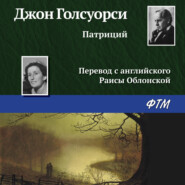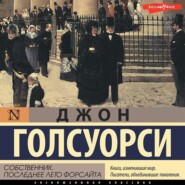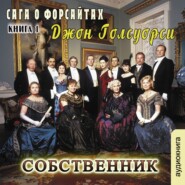По всем вопросам обращайтесь на: info@litportal.ru
(©) 2003-2024.
✖
Beyond
Настройки чтения
Размер шрифта
Высота строк
Поля
“Yes.”
The logs hissed and crackled; the long flames ruffled in the chimney-draught; the wind roared outside – then, so suddenly that it took his breath away:
“Dad, are you really and truly my father?”
When that which one has always known might happen at last does happen, how little one is prepared! In the few seconds before an answer that could in no way be evaded, Winton had time for a tumult of reflection. A less resolute character would have been caught by utter mental blankness, then flung itself in panic on “Yes” or “No.” But Winton was incapable of losing his head; he would not answer without having faced the consequences of his reply. To be her father was the most warming thing in his life; but if he avowed it, how far would he injure her love for him? What did a girl know? How make her understand? What would her feeling be about her dead mother? How would that dead loved one feel? What would she have wished?
It was a cruel moment. And the girl, pressed against his knee, with face hidden, gave him no help. Impossible to keep it from her, now that her instinct was roused! Silence, too, would answer for him. And clenching his hand on the arm of his chair, he said:
“Yes, Gyp; your mother and I loved each other.” He felt a quiver go through her, would have given much to see her face. What, even now, did she understand? Well, it must be gone through with, and he said:
“What made you ask?”
She shook her head and murmured:
“I’m glad.”
Grief, shock, even surprise would have roused all his loyalty to the dead, all the old stubborn bitterness, and he would have frozen up against her. But this acquiescent murmur made him long to smooth it down.
“Nobody has ever known. She died when you were born. It was a fearful grief to me. If you’ve heard anything, it’s just gossip, because you go by my name. Your mother was never talked about. But it’s best you should know, now you’re grown up. People don’t often love as she and I loved. You needn’t be ashamed.”
She had not moved, and her face was still turned from him. She said quietly:
“I’m not ashamed. Am I very like her?”
“Yes; more than I could ever have hoped.”
Very low she said:
“Then you don’t love me for myself?”
Winton was but dimly conscious of how that question revealed her nature, its power of piercing instinctively to the heart of things, its sensitive pride, and demand for utter and exclusive love. To things that go too deep, one opposes the bulwark of obtuseness. And, smiling, he simply said:
“What do you think?”
Then, to his dismay, he perceived that she was crying – struggling against it so that her shoulder shook against his knee. He had hardly ever known her cry, not in all the disasters of unstable youth, and she had received her full meed of knocks and tumbles. He could only stroke that shoulder, and say:
“Don’t cry, Gyp; don’t cry!”
She ceased as suddenly as she had begun, got up, and, before he too could rise, was gone.
That evening, at dinner, she was just as usual. He could not detect the slightest difference in her voice or manner, or in her good-night kiss. And so a moment that he had dreaded for years was over, leaving only the faint shame which follows a breach of reticence on the spirits of those who worship it. While the old secret had been quite undisclosed, it had not troubled him. Disclosed, it hurt him. But Gyp, in those twenty-four hours, had left childhood behind for good; her feeling toward men had hardened. If she did not hurt them a little, they would hurt her! The sex-instinct had come to life. To Winton she gave as much love as ever, even more, perhaps; but the dew was off.
III
The next two years were much less solitary, passed in more or less constant gaiety. His confession spurred Winton on to the fortification of his daughter’s position. He would stand no nonsense, would not have her looked on askance. There is nothing like “style” for carrying the defences of society – only, it must be the genuine thing. Whether at Mildenham, or in London under the wing of his sister, there was no difficulty. Gyp was too pretty, Winton too cool, his quietness too formidable. She had every advantage. Society only troubles itself to make front against the visibly weak.
The happiest time of a girl’s life is that when all appreciate and covet her, and she herself is free as air – a queen of hearts, for none of which she hankers; or, if not the happiest, at all events it is the gayest time. What did Gyp care whether hearts ached for her – she knew not love as yet, perhaps would never know the pains of unrequited love. Intoxicated with life, she led her many admirers a pretty dance, treating them with a sort of bravura. She did not want them to be unhappy, but she simply could not take them seriously. Never was any girl so heart-free. She was a queer mixture in those days, would give up any pleasure for Winton, and most for Betty or her aunt – her little governess was gone – but of nobody else did she seem to take account, accepting all that was laid at her feet as the due of her looks, her dainty frocks, her music, her good riding and dancing, her talent for amateur theatricals and mimicry. Winton, whom at least she never failed, watched that glorious fluttering with quiet pride and satisfaction. He was getting to those years when a man of action dislikes interruption of the grooves into which his activity has fallen. He pursued his hunting, racing, card-playing, and his very stealthy alms and services to lame ducks of his old regiment, their families, and other unfortunates – happy in knowing that Gyp was always as glad to be with him as he to be with her. Hereditary gout, too, had begun to bother him.
The day that she came of age they were up in town, and he summoned her to the room, in which he now sat by the fire recalling all these things, to receive an account of his stewardship. He had nursed her greatly embarrassed inheritance very carefully till it amounted to some twenty thousand pounds. He had never told her of it – the subject was dangerous, and, since his own means were ample, she had not wanted for anything. When he had explained exactly what she owned, shown her how it was invested, and told her that she must now open her own banking account, she stood gazing at the sheets of paper, whose items she had been supposed to understand, and her face gathered the look which meant that she was troubled. Without lifting her eyes she asked:
“Does it all come from – him?”
He had not expected that, and flushed under his tan.
“No; eight thousand of it was your mother’s.”
Gyp looked at him, and said:
“Then I won’t take the rest – please, Dad.”
Winton felt a sort of crabbed pleasure. What should be done with that money if she did not take it, he did not in the least know. But not to take it was like her, made her more than ever his daughter – a kind of final victory. He turned away to the window from which he had so often watched for her mother. There was the corner she used to turn! In one minute, surely she would be standing there, colour glowing in her cheeks, her eyes soft behind her veil, her breast heaving a little with her haste, waiting for his embrace. There she would stand, drawing up her veil. He turned round. Difficult to believe it was not she! And he said:
“Very well, my love. But you will take the equivalent from me instead. The other can be put by; some one will benefit some day!”
At those unaccustomed words, “My love,” from his undemonstrative lips, the colour mounted in her cheeks and her eyes shone. She threw her arms round his neck.
She had her fill of music in those days, taking piano lessons from a Monsieur Harmost, a grey-haired native of Liege, with mahogany cheeks and the touch of an angel, who kept her hard at it and called her his “little friend.” There was scarcely a concert of merit that she did not attend or a musician of mark whose playing she did not know, and, though fastidiousness saved her from squirming in adoration round the feet of those prodigious performers, she perched them all on pedestals, men and women alike, and now and then met them at her aunt’s house in Curzon Street.
Aunt Rosamund, also musical, so far as breeding would allow, stood for a good deal to Gyp, who had built up about her a romantic story of love wrecked by pride from a few words she had once let drop. She was a tall and handsome woman, a year older than Winton, with a long, aristocratic face, deep-blue, rather shining eyes, a gentlemanly manner, warm heart, and one of those indescribable, not unmelodious drawls that one connects with an unshakable sense of privilege. She, in turn, was very fond of Gyp; and what passed within her mind, by no means devoid of shrewdness, as to their real relationship, remained ever discreetly hidden. She was, so far again as breeding would allow, something of a humanitarian and rebel, loving horses and dogs, and hating cats, except when they had four legs. The girl had just that softness which fascinates women who perhaps might have been happier if they had been born men. Not that Rosamund Winton was of an aggressive type – she merely had the resolute “catch hold of your tail, old fellow” spirit so often found in Englishwomen of the upper classes. A cheery soul, given to long coats and waistcoats, stocks, and a crutch-handled stick, she – like her brother – had “style,” but more sense of humour – valuable in musical circles! At her house, the girl was practically compelled to see fun as well as merit in all those prodigies, haloed with hair and filled to overflowing with music and themselves. And, since Gyp’s natural sense of the ludicrous was extreme, she and her aunt could rarely talk about anything without going into fits of laughter.
Winton had his first really bad attack of gout when Gyp was twenty-two, and, terrified lest he might not be able to sit a horse in time for the opening meets, he went off with her and Markey to Wiesbaden. They had rooms in the Wilhelmstrasse, overlooking the gardens, where leaves were already turning, that gorgeous September. The cure was long and obstinate, and Winton badly bored. Gyp fared much better. Attended by the silent Markey, she rode daily on the Neroberg, chafing at regulations which reduced her to specified tracks in that majestic wood where the beeches glowed. Once or even twice a day she went to the concerts in the Kurhaus, either with her father or alone.
The first time she heard Fiorsen play she was alone. Unlike most violinists, he was tall and thin, with great pliancy of body and swift sway of movement. His face was pale, and went strangely with hair and moustache of a sort of dirt-gold colour, and his thin cheeks with very broad high cheek-bones had little narrow scraps of whisker. Those little whiskers seemed to Gyp awful – indeed, he seemed rather awful altogether – but his playing stirred and swept her in the most uncanny way. He had evidently remarkable technique; and the emotion, the intense wayward feeling of his playing was chiselled by that technique, as if a flame were being frozen in its swaying. When he stopped, she did not join in the tornado of applause, but sat motionless, looking up at him. Quite unconstrained by all those people, he passed the back of his hand across his hot brow, shoving up a wave or two of that queer-coloured hair; then, with a rather disagreeable smile, he made a short supple bow or two. And she thought, “What strange eyes he has – like a great cat’s!” Surely they were green; fierce, yet shy, almost furtive – mesmeric! Certainly the strangest man she had ever seen, and the most frightening. He seemed looking straight at her; and, dropping her gaze, she clapped. When she looked again, his face had lost that smile for a kind of wistfulness. He made another of those little supple bows straight at her – it seemed to Gyp – and jerked his violin up to his shoulder. “He’s going to play to me,” she thought absurdly. He played without accompaniment a little tune that seemed to twitch the heart. When he finished, this time she did not look up, but was conscious that he gave one impatient bow and walked off.
That evening at dinner she said to Winton:
“I heard a violinist to-day, Dad, the most wonderful playing – Gustav Fiorsen. Is that Swedish, do you think – or what?”
Winton answered:
“Very likely. What sort of a bounder was he to look at? I used to know a Swede in the Turkish army – nice fellow, too.”
“Tall and thin and white-faced, with bumpy cheek-bones, and hollows under them, and queer green eyes. Oh, and little goldy side-whiskers.”
“By Jove! It sounds the limit.”
Gyp murmured, with a smile:
“Yes; I think perhaps he is.”
She saw him next day in the gardens. They were sitting close to the Schiller statue, Winton reading The Times, to whose advent he looked forward more than he admitted, for he was loath by confessions of boredom to disturb Gyp’s manifest enjoyment of her stay. While perusing the customary comforting animadversions on the conduct of those “rascally Radicals” who had just come into power, and the account of a Newmarket meeting, he kept stealing sidelong glances at his daughter.
Certainly she had never looked prettier, daintier, shown more breeding than she did out here among these Germans with their thick pasterns, and all the cosmopolitan hairy-heeled crowd in this God-forsaken place! The girl, unconscious of his stealthy regalement, was letting her clear eyes rest, in turn, on each figure that passed, on the movements of birds and dogs, watching the sunlight glisten on the grass, burnish the copper beeches, the lime-trees, and those tall poplars down there by the water. The doctor at Mildenham, once consulted on a bout of headache, had called her eyes “perfect organs,” and certainly no eyes could take things in more swiftly or completely. She was attractive to dogs, and every now and then one would stop, in two minds whether or no to put his nose into this foreign girl’s hand. From a flirtation of eyes with a great Dane, she looked up and saw Fiorsen passing, in company with a shorter, square man, having very fashionable trousers and a corseted waist. The violinist’s tall, thin, loping figure was tightly buttoned into a brownish-grey frock-coat suit; he wore a rather broad-brimmed, grey, velvety hat; in his buttonhole was a white flower; his cloth-topped boots were of patent leather; his tie was bunched out at the ends over a soft white-linen shirt – altogether quite a dandy! His most strange eyes suddenly swept down on hers, and he made a movement as if to put his hand to his hat.
‘Why, he remembers me,’ thought Gyp. That thin-waisted figure with head set just a little forward between rather high shoulders, and its long stride, curiously suggested a leopard or some lithe creature. He touched his short companion’s arm, muttered something, turned round, and came back. She could see him staring her way, and knew he was coming simply to look at her. She knew, too, that her father was watching. And she felt that those greenish eyes would waver before his stare – that stare of the Englishman of a certain class, which never condescends to be inquisitive. They passed; Gyp saw Fiorsen turn to his companion, slightly tossing back his head in their direction, and heard the companion laugh. A little flame shot up in her.
Winton said:

















